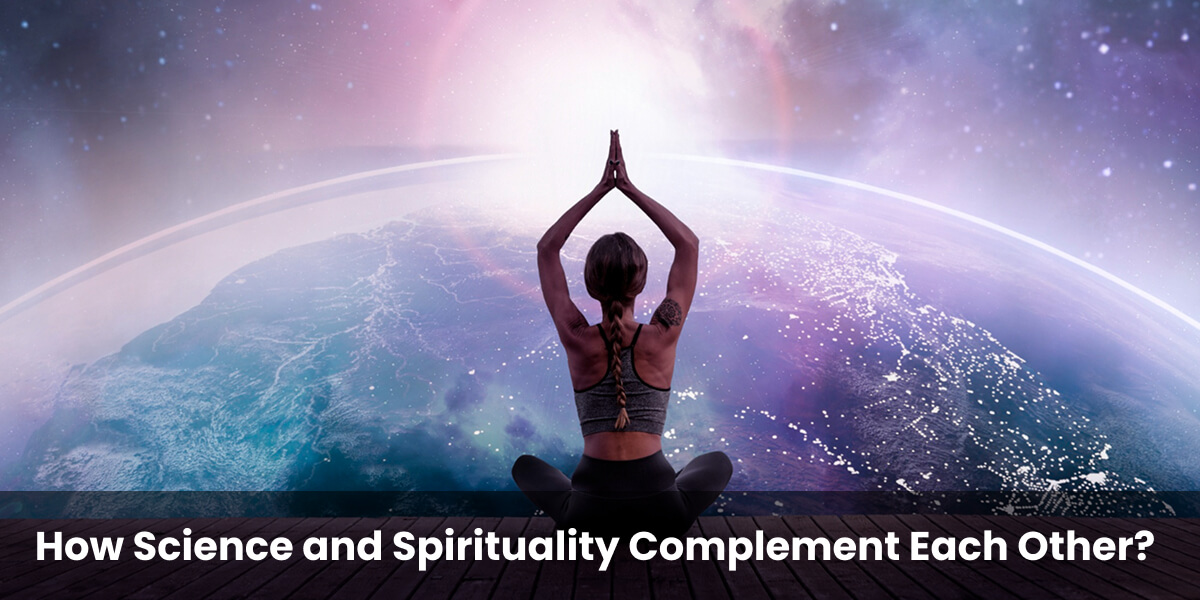Science and spirituality seem to have become two distinct ways in a modern world as the first is based on rationalism and reason the second is founded on faith and inner contemplation. But deep down they are not that polar. Their ends are different, but in each case they have set out to answer the same basic questions: Who are we? What are we doing in this place? What is the reality?
Through the two we can reveal a fuller explanation with science focusing on how life works and spirituality how it works with a purpose. They make a combination in unity to form the harmony of knowledge and wisdom.
Understanding Science and Spirituality
Science is concerned with facts, experimentations and visible reality. It is data and logic based in explaining the phenomena of nature. Spirituality however, is closer to individual progress and awareness and the desire to find meaning outside the material realm.
They are initially thought to be the opposite of each other, the first is external and analytical, that is science, whereas the latter is internal and intuitive, that is spirituality. But we have a wider picture when they are together. Science is also the development of mind and spirituality develops soul.
Related Blog: What Is Spirituality? Understanding Its Meaning and Importance
The Perceived Gap Between Science and Spirituality
Science and spirituality are believed to be conflicting in the minds of people over the centuries. One sphere challenged the other, science debunked beliefs that did not support facts, and on the other hand, spirituality perceived science as one of the disciplines that were too inflexible to understand the invisible aspects of life. This gap caused redundant stress.
The two, however, are not clinching but partners as results of modern research are revealing. The gap is slowly being closed by shiny neuroscience, psychology and quantum physics, that is also finding out what the spiritual traditions have long told us to be true.
How Science and Spirituality Align?
The truth is, science and spirituality do not contradict numerous postulates. Both promote skepticism, open-mindedness, and it seeks truth. Science explains that all things are energy and on the other side spirituality educates that all things are linked with universal consciousness.
Even activities such as meditation and mindfulness that used to be regarded solely by spiritual benefits are now supported scientifically on the basis of their brain and body benefits. The correspondence makes us understand one truth though the directions may vary.
Examples of Science Supporting Spiritual Practices
It has been making ancient spiritual practices more and more accepted by scientific research. Among the examples that should be noted, there are:
- Mindfulness and meditation -Tested to relieve stress, enhance concentration and expand grey matter of the brain.
- Yoga – It was found that yoga makes you more flexible, increases your immunity and helps you to maintain hormone balance.
- Gratitude and prayer- They are connected with better emotional health and better resilience.
- Breathing regulation (Pranayama) – It has been found to regulate the nervous system and increase oxygen supply.
- Sound healing and chanting- It has been found to help even out these cardiac beats and quiet the mind.
Examples of Spiritual Practices Supporting Science
Quite interestingly, spirituality also triggered scientific development. A lot of great discoveries are driven by the blind use of intuition or by meditative thought. Examples are:
- The theory of relativity of Einstein -Many a time, he attributed it to imagination and intuition, which were attributes cultivated by the process of profound thinking.
- Nikola Tesla – Used states of a higher consciousness as a source of inspiration on which the creation of inventions was based.
- Ayurveda and herbal medicine:The theory underpinning modern pharmacology can be traced to spiritual traditions.
- Mind-body – Ancient and traditional influences-Ancient traditions shaped psychology and psychiatry to explore the field of holistic healing.
- Spiritual concept of oneness – Spiritual concepts of interconnected particles are similar to the scientific thinking of communicating particles.
Related Blog: Spiritual Development Practices for a Balanced Life
Benefits of Merging Science and Spirituality in Daily Life
When we unite science with spirituality, we lead a more balanced, meaningful and healthier life. Its advantages are in some part:
- Relieves mental health- lessens stress, anxiety, and depression.
- Advanced concentration and performance Knowledge-based meditation enhances performance.
- Higher emotional stability Surrounding oneself with spiritual activities makes one have inner peace.
- Healthier body- Yoga and mindfulness boost immunity and the heart.
- Whole picture outlook: Science gives insight into how to make it work, spirituality gives insight into why it is important.
- More fulfilment -When one finds a sense of purpose combining logic and faith together.
FAQs About Science and Spirituality
The domains of science and spirituality have the ability to evoke interest in individuals as well as stir up curiosity in many so that they may desire to find out how these two seemingly diverging paths can be related to each other. Listed are some questions that appear to recur across the board and are explained reasonably clear and in reasonable depth.
Q1. Can science measure spiritual experiences?
With the invention of brain imaging tools, electroencephalogram (EEG) scans and heart-rate monitors, science may allow researchers to understand how spiritual practices affect the body and psychological mind. Meditation and prayer, as one can see in an example, have been shown to lead to stimulation of parts of the brain connected to attention, caring and emotional restraint. Systematic spirituality is also reported to decrease stress levels that is determined by the amount of cortisol.
But science has the competences of quantifying only the physical and the psychological influences but not the mysteries of the spiritual influences. Such emotions like transcendence, union with God or a self-still heart are subjective and particular to the bearer. They belong to the world which is not taken by machines, and that regardless of the possibility of measuring all that is worth attaining the world cannot be measured alone.
Q2. Can spirituality influence scientific thinking?
Of course, science has been known to be a fruit of spirituality. Numerous eminent scientists have confessed that it was not only the laboratory that gave them their insights but self-reflection, imaginative thought, or inspiration- traits honed by spirituality. Albert Einstein, as an example, wrote of being in wonderment and favour of the universe and this had a substantial effect owing to his science adventures. Nikola Tesla frequently noted that his thoughts came to him when he was in a profound contemplation, or what to non-canonical people would be meditation.
Spirituality promotes free-thinking, imagination and the capacity to look beyond the obvious. These virtues compel the sciences to go beyond their boundaries of inquiry instead of remaining in well-defined structures. Spirituality in this manner sustains the cause of why one undertakes scientific investigation.
Q3. Can science and spirituality coexist?
Certainly, they do not simply co-exist, but nurture the other. Science gets into the facts, evidence and processes of the physical world, whereas spirituality goes into the meaning, values and interior experience. The two give a more in-depth rough picture of life- science as to how then spirituality as to the why.
They do not contradict each other but instead, should be considered as two pairs of glasses that help us see the reality. Put together they will serve to guide us to lead a more balanced life. To give an example, medical science takes care of the treatment of the illness but their spiritual practises such as gratitude, prayer and meditation aid in emotional recovery, resilience and hope. This poise indicates that spirituality and science can be used together.
Q4. What are some scientific benefits of meditation?
What used to be considered as a spiritual practice (namely meditation) is today also a subject of further investigation by scientists around the world. It has been discovered that it reduces stress levels as it lowers cortisol, improves concentration through increased brain neurotransmission pathways and it also benefits in stabilisation of emotional levels through calming of the nervous system.
The brain itself has been shown to alter structurally in long-term meditators such as the growth of extra gray matter in the area of the brain responsible in memory, empathy and decision-making. It further optimizes sounder sleep, an immune system, and decreased the likelihood of anxiety and depression. These findings support the fact that meditation is neither a religious practice nor a speculative technique in mental and physical well-being.
Q5. Is spirituality supported by scientific research?
Indeed, science, as we know it today, has confirmed that most spiritual practices do have some tangible benefits. In the other analogy, yoga enhances flexibility, expands lung capacity and fine-tunes the hormones; prayer and gratitude are claimed to boost the immunity and emotional strength, and mindfulness is a type of therapy used in treating depression, PTSD and addiction.
Besides physical wellness, it is proved that spirituality contributes to the development of the sense of purpose, the action of compassion and an overall feeling of contentment. Science is perhaps not in a position to completely justify either the mystical or divine aspect of spirituality but it does prove that the said disciplines do lead to healthier, happier and more gratifying lives. This gradual literature shows that spirituality is friendly and not opposed to science but hand in hand they match perfectly with science.
Conclusion
Although science and spirituality are usually seen as antithetical to each other, the two are in reality two sides to the process of arriving at truth. Science has equipped us with logic, evidence and understanding of the externality, spirituality, with wisdom, meaning and an inner journey.
Added to each other they form a middle path in life-where facts enter in the faith, and reason meets with intuition. The embracing of both not only enables us to see the world in a better way, but it also enables us to live in a state of a greater piece, purpose and fulfillment.









Post a Comment